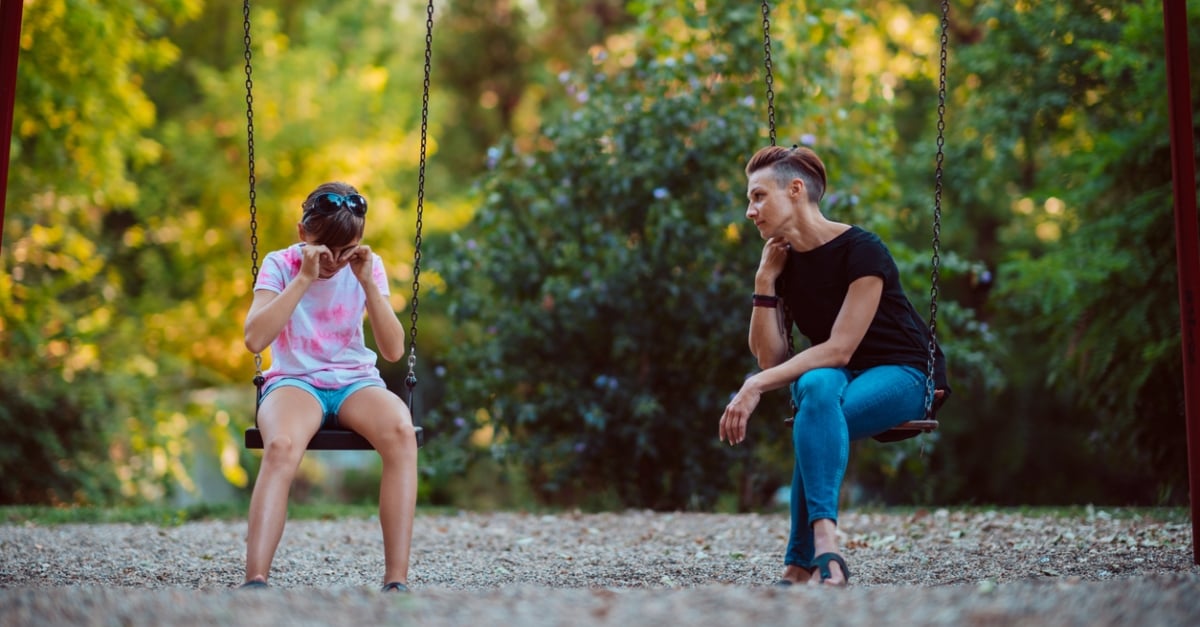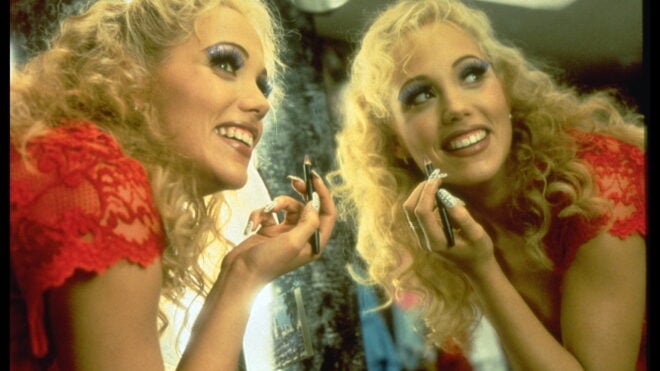
At 10 years of age, my oldest child has become increasingly challenging for me to get along with as she enters the puberty years. It seems like centuries ago that she was mostly cheery with me, or even laid back half the time, because when nearly every conversation ends (or begins) with an eye-roll, the days are long. Really long.
Before you get the wrong idea, let me just tell you, my kid is sweet. She's the kind of person who sees something on TV and says, "Claire would like that," rather than, "I want that." She's wonderful to her friends, her teachers, her grandparents … pretty much everyone but me. Well, and her little brother, whose life's mission is pretty much to annoy her (which is not all that tough of a feat). She's a kind and happy person in general — but at home, she's highly irritable.
I try to shrug it off and breathe through it. But after the 15th sassy comment of the day before 8 a.m., I am often grinding my teeth to keep from yelling. There's nothing she likes for breakfast, her brother took the remote, I dared to ask her to put her dish in the sink … the list of things that get under her skin seems to grow on the regular.
I would've thought I'd be better at coping with my daughter's hormone-induced rage. After all, I went through the same thing myself. I was downright rotten. I was so awful to my mother she still refers to the years between 11 and 14 as "the dark ages." I was an early bloomer, I guess. But for my mother, it felt young for me to start acting up. I'm sure it was confusing.
Because I started going through puberty at an early age, I anticipated that much from my daughter. What I didn't expect was how emotionally taxing it is to be on the receiving end of the rudeness, the shortness, the emotional roller coaster. I'm an adult — I should be able to let it go. But the thing is, it's hurtful to be talked down to constantly — even by a child. And it's especially hurtful when I'm trying so hard to avoid her wrath. I often feel like there's nothing I can do right anymore.
Lately, I've started to crack. And after one epically awful day filled with one too many snotty comments, I found myself screaming until my throat was sore. My daughter cried in her bed, and I was guilt-ridden after only a minute. I stayed that way for three days — feeling utterly awful that I'd let my emotions get the best of me. Even though it was clear I needed some kind of release, I know by now that yelling at my kids in a way that feels uncontrolled or potentially damaging is never the way to go. But I snapped. We all snap sometimes.
After my explosion, I had a talking to with myself. I told myself that I wouldn't take her behavior so personally, that I would do my best to show her compassion because that's what she needed. Yelling wouldn't solve anything. All it would really do is hurt the both of us.
I don't always have the best patience as a mom. But I'm great at apologizing. After calming down, I crept in my daughter's bed and talked to her. I told her that it wasn't OK for me to yell at her the way I had, but I also let her know how it makes me feel when she talks to me so rudely. I opened up to her about how her behavior was hurting me, and how it hurts her younger brother. And I told her that I know it's incredibly hard to be growing through the emotions that I know she's in the midst of — I remember how hard it is.
I could tell she felt relieved that I said I'm sorry, and that I vowed to be more patient. She promised she would try harder, too. If I'm being really honest, I'm not exactly expecting a huge shift, because the thing is, 10 is really young to be so challenged by your shifting hormones and fiery emotions. Speaking from experience, I know that it's a lot to handle and that the process isn't always pretty.
We talk a lot about the physical changes that happen to kids during puberty. But the mental changes are more important, and they're so hard to cope with. If you've always been a pretty happy kid, feeling grumpy, tired, or irritated all the time can be confusing. It can be utterly painful. I mean, there's a reason adults often say they wouldn't ever want to live through those years again — they're just filled with so much turmoil.
I definitely do not have all of the answers when it comes to standing by and watching my daughter go from my sweet little girl to a young woman. It's painful for me, too. I feel like I've lost someone I once knew. Sometimes, when her younger brother snuggles up to me at night, I yearn for her to come and get in my bed and cuddle up to me on the other side. She really doesn't do that anymore. Maybe once in a while. She used to always hold my hand, too. Even just in the past few months, she's stopped taking it when I offer it to her.
But I also know that my sadness is secondary to what she's going through. I know that because the struggles I'm having with my daughter are just one part of my life. For her, if I remember correctly, the turmoil she's feeling right now feels like her entire life. Because it kind of is. It's all-encompassing and it's probably going to feel that way for a while. The least I can do is try to be compassionate.
That doesn't mean agreeing with her all the time. And it doesn't mean letting her disrespect me. But it means controlling my own behavior, looking for moments to connect, and not taking her actions so personally. If I know anything at all, I know that it's not about me, even when it feels like it is. That doesn't mean it doesn't hurt, but it doesn't have to ruin my day, every day.
It's easier said than done to keep practicing kindness when your kid is throwing you curveballs. But I also know that kids act out when they're struggling — and that's when they need kindness the most.
We may not ever have the relationship we had before. But I'm hoping that someday we'll find a new good place on the other side of all of this. One where she may not hold my hand, but she knows I'm close by.




